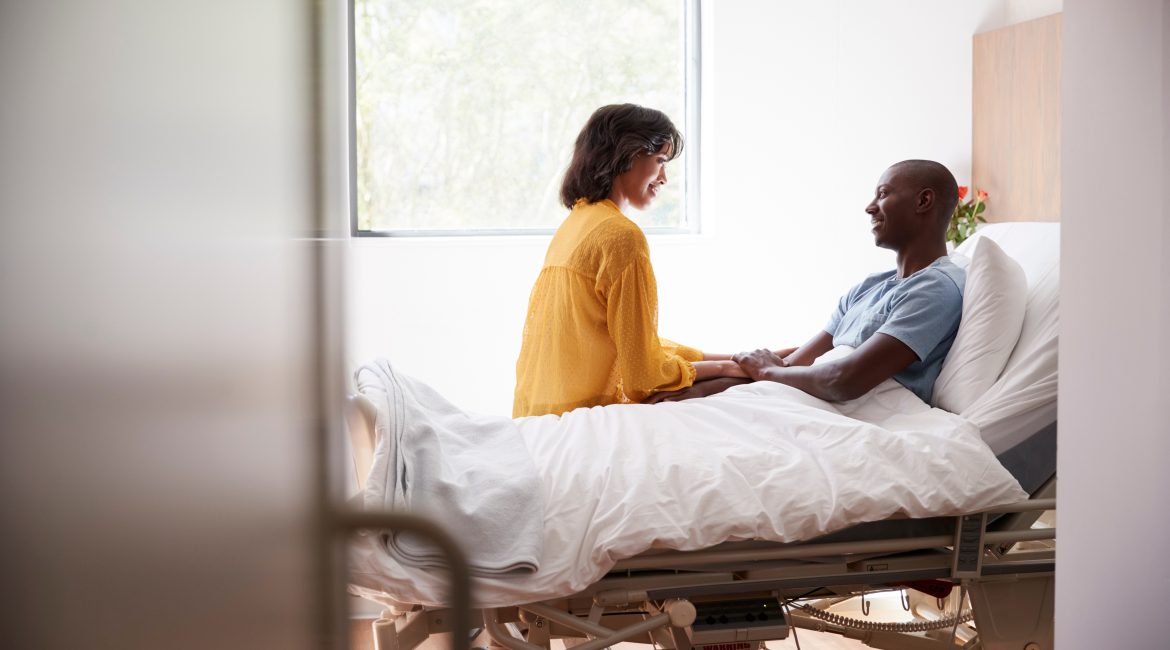Do you know the proper protocol for a hospital visit with a loved one or friend? Read more to learn about the best hospital etiquette.
Having a loved one in the hospital is a stressful time. You want to make sure they are okay, that they’re being looked after and you want to surround them with as much support as possible. But if you aren’t familiar with being in a hospital or by the bedside of a patient, there may be added anxiety.
Every scenario is different and there are plenty of reasons somebody may be in the hospital. Of course, you will be able to judge what your friend or family member needs, but your assumptions may cause more harm than good.
Combine your good intentions with good hospital etiquette, and you’ll be a great support system for the patient and healthcare workers.
Discover: Do you want access to private sector healthcare? We’ll show you how you CAN afford it.
Do list for hospital visitors
Do stay for a short and sweet visit
We know you may be anxious to spend time with your loved ones and to be by their side through thick and thin, but you should be aware of overstaying your welcome. Long visits from one person can tire out a patient and they may feel awkward about asking you to leave. Rather make your visits more frequent if possible, but shorter in duration.
Do ask the patient’s permission to visit before you arrive
If you’re resting after a big operation or resting after a traumatising accident, you may not be up for visitors. Put yourself in the patient’s shoes and try to understand that they may feel overwhelmed or drained by visits. Ask them beforehand if they’re ready to see people. They may prefer that you visit in a few days or visit their home once they’ve been discharged.
Check in with hospital visiting hours as well. They have dedicated hours to make sure the hospital runs smoothly.
Do leave the room if the doctor or provider arrives to examine or talk to the patient
If a doctor or nurse comes into the room during your visit, don’t wait for them to ask you to leave. Of course, if you are a spouse, mother, father or child of the patient there may be an exception. The conversations between a doctor and their patient are confidential and you can come back in the room once the medical practitioner leaves.
Do practice good hygiene
It is so important to make sure your hands are cleaned and sanitised when you visit somebody in the hospital. Hospitals can’t afford any infections spreading throughout the hospital.
Do check before bringing balloons or flowers
Your beautiful bouquet and colourful balloons may be harmful to patients. Avoid bringing in fragrant or latex gifts as they may cause allergic reactions. This is especially important if the patient has roommates. These rules are to protect them, too.
Read this: Health Insurance vs Medical Aid vs Hospital Plans: 5 Key Differences
Don’t list for hospital visitors
Don’t enter the hospital if you feel ill
Even if you’ve ruled it out as a common cold, stay away if you have any contagious symptoms. Hospitals have a lot of immunocompromised patients who won’t recover if they catch even a slight illness.
Don’t take food to your patient unless you know they can eat it
After surgery or whilst they’re on medication, the person you’re visiting may be on a restricted diet. Check with them or their doctor as to what food they are allowed.
Don’t visit if your presence will cause distress
If you and the patient in question have unresolved issues, this is not the time to sort them out. You may feel emotional when somebody with whom you aren’t on great terms falls ill – but you may want to put your feelings aside until they are better rested.
This doesn’t mean ignore them but rather let them know you care and wait until they are better before you have any massive heart-to-hearts.
Don’t smoke before visiting or during a visit
As a smoker, you may not pick up on the smell of cigarettes, but patients in the hospital definitely will. Considering the area is well sterilised and some medications cause a heightened sense of smell, the smell may cause discomfort or nausea to patients.
More seriously, it may cause cravings for patients who are not allowed to smoke whilst they recover.
Don’t assume they wouldn’t appreciate a hospital visit
This is the last rule on the list and probably the most important one: don’t stay home because you assume your loved one would rather you didn’t visit. It is not up to them to invite you and moral support during hospitalisation can make all the difference in the world.
Read next: What Does Emergency Casualty Cover Entail?
Your Health Insurance Family,




